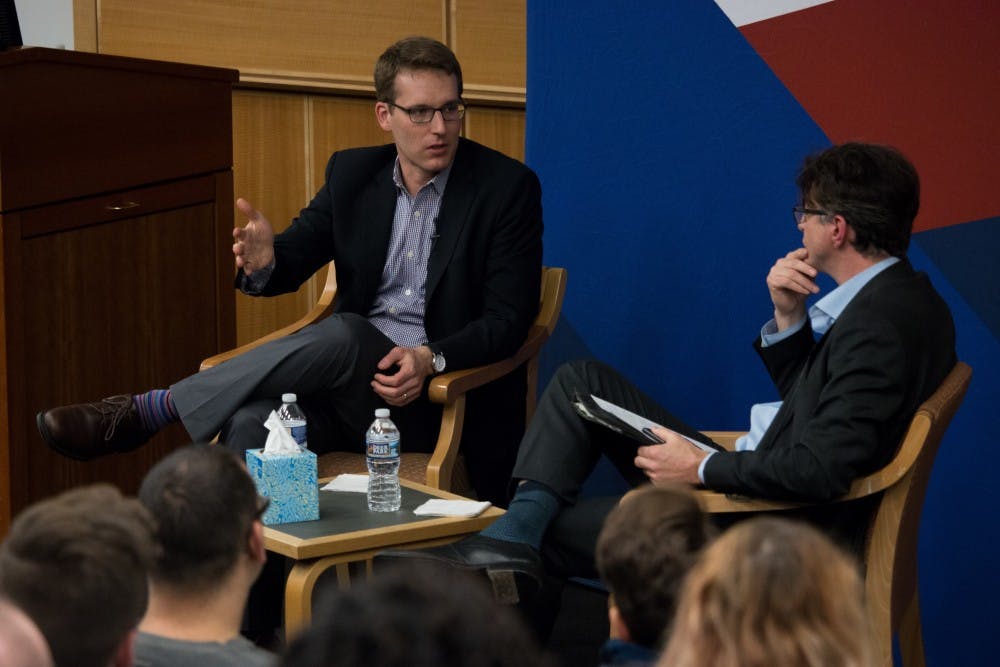
The Pulitzer Prize-winning reporter who first broke the story of President Donald Trump bragging about groping women without their consent came to Penn on Tuesday evening.
Speaking at the Annenberg School for Communication, the Washington Post reporter David Fahrenthold detailed his experiences covering Trump and discussed how journalism has changed in recent years.
Fahrenthold, who started at the Post 17 years ago covering homicides during the night shift, rose to national prominence during the 2016 presidential campaign. The 2000 Harvard University graduate wrote a series of investigative articles revealing that Trump had exaggerated the extent of his charitable giving. He was also the first to break the story of a 2005 video showing Trump making lewd comments about kissing and touching women without their consent.
Fahrenthold told students he first picked up the story on Trump's charitable giving during a campaign rally in Iowa held in February last year. At the event, Trump made a show of presenting a $100,000 check to a local veteran’s charity from the Donald J. Trump Foundation, which Fahrenthold said he found strange. Later that month, Trump hosted a rally where he promised to donate $1 million of his own money to a veterans charity.
“The cardinal rule of charity is that you can’t use it to boost a political campaign,” Fahrenthold said.
While conducting his investigation into Trump's promised donation to the veteran's charity, Fahrenthold said he was forced to deploy methods beyond his traditional journalistic training. The reporter turned to Twitter on May 24, 2016 to ask his followers whether they knew anything about the donation, all the while tagging Trump in his tweets.
The overwhelming number of responses surprised Fahrenthold, but few of them promised concrete evidence, he said. However, later that night the Post reporter received a phone call from Trump, who said he had already given the money to the Marine Corps-Law Enforcement Foundation, which helps families of fallen Marines. When Fahrenthold pressed him on whether he would have actually given the money away if not for his reporting, the conversation turned personal.
“He called me a nasty guy,” Fahrenthold said, prompting laughter from students in the crowd. Despite Trump's criticisms, Fahrenthold won a Pulitzer Prize this April for national reporting for his series of stories that "created a model for transparent journalism in political campaign coverage."
Wharton freshman John Casey said he enjoyed the behind-the-scenes look into the life of a political journalist.
“It gives me a clearer picture of politics, and made it more engaging for me as a political science student,” Casey said.
Wharton freshman Jordan Taylor agreed, adding that the event gave insight into the life of an investigative reporter.
“My favorite part was how he had push through to find the information he wanted,” Taylor said. “It shows how relentless you have to be to find success.”
Fahrenthold also said he had observed a revival of public support for journalism since the 2016 election. He acknowledged that much of this interest is due to the volume of news surrounding the president, but argued that newspapers need to do more than “just cover Trump.”
To capitalize on its growing audience, Fahrenthold said the Post has been working to hire more investigative journalists and technology reporters. He said the newspaper has changed significantly since he started there in 2000, but added that he wanted to end his talk with a time-honored tip for journalists.
“Never assume anything, go back to every story, and check how every sentence can be wrong,” Fahrenthold said.
The Daily Pennsylvanian is an independent, student-run newspaper. Please consider making a donation to support the coverage that shapes the University. Your generosity ensures a future of strong journalism at Penn.
Donate



